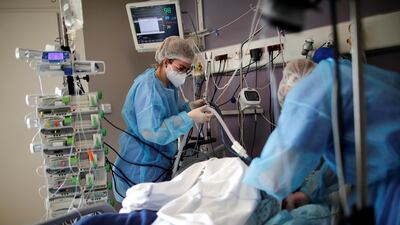A new patient is admitted to intensive care in Paris every 12 minutes as France struggles to get to grips with new, more dangerous Covid variants.
The situation in Greater Paris is "especially worrying" and the government will take extra restrictive measures there if the pandemic continues at its current pace, France's health minister said.
To manage hospital capacity in Paris, authorities are ready to cancel surgeries and transfer patients to other regions.
While new infections are not growing exponentially, the numbers taken into intensive care reached a new three-and-a-half-month high nationally, close to 4,000.
"At this moment we can say that the variants are more contagious and more dangerous and they now represent more than two thirds of infections in France," said Olivier Veran, Minister for Solidarity and Health.
The UK strain spreading across the world could be up to twice as deadly as previous variants, a study found this week.
Epidemiologists from the universities of Exeter and Bristol said that the new highly infectious variant had "significantly higher" mortality.
It is now "taking over" and causing 98 per cent of all cases in the UK, said the scientist leading the country's variant-tracking research.
Sharon Peacock, director of the Covid-19 Genomics UK consortium of scientists monitoring mutations in the coronavirus, said the UK variant – known as B117 – also appears to be gaining a grip in many of the 100 or so other countries it has spread to in the past few months.
Revealing the speed with which patients are admitted to intensive care – the equivalent of five an hour – Mr Veran said he did not know when the current peak of the epidemic would be reached.
France has imposed local weekend lockdowns, on top of a national 6pm curfew, in northern and southern parts of the country. But the government has so far resisted such measures for greater Paris.
In the Paris region, the number of people in intensive care units is now close to 1,100 and could reach 1,500 by the end of March if the current trend continues, Mr Veran said, and that reaching that level would be critical for the area's hospital system.
"We will take all necessary measures if the spread of the pandemic maintains its current rhythm," he said.

France hopes its vaccination drive will enable it to avoid new restrictive measures. Reacting to some European countries suspending the AstraZeneca shot amid fears of blood clots, Mr Veran said France saw no reason to follow suit.
The number of new cases in France went up by 27,166 on Thursday, to 3.99 million, the world's sixth-highest total and about four times higher than in the UK.
The seven-day moving average of daily new infections stands at 22,105, topping 22,000 for the first time since November 22.
There were 265 deaths over the past 24 hours, taking the total to 89,830, the seventh-highest in the world, versus a seven-day moving average of 285.
France is trying to speed up vaccinations after getting off to a slow start. In the 24-hour period to Thursday evening it administered 286,000 vaccinations, bringing the total to 6.7 million. More than two million people have had a second injection. In contrast, 22.8 million people have had a first jab in the UK and 1.25 million a second.
The French government aims to vaccinate 10 million people by mid-April, 20 million by mid-May and 30 million by the summer.










